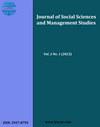尼日利亚的金融包容性和经济增长
引用次数: 0
摘要
普惠金融是指以合理价格向家庭、企业和行政部门提供金融服务和信贷的做法。它包括旨在扩大在经济框架内利用官方提供的资金的措施。本研究采用事后研究设计来评估与GDP增长有关的银行渗透率、金融服务使用和金融服务获取等要素的数据。利用自回归分布滞后模型(ARDL)分析了这些因素之间的相互关系和相互作用,显示出较强的解释能力和统计有效性。研究表明,如果没有获得金融服务、使用金融服务和银行渗透的投入,自我维持的国内生产总值(GDP)是负的,在统计上值得注意。在短期内,GDP与获得金融服务(AFS)之间存在负相关关系;然而,从长期来看,AFS与实际GDP (RGDP)呈正相关。金融服务(UFS)的使用显示出与GDP的良好关系,强调了提高金融知识和激励个人和企业有效利用金融服务的必要性。当前阶段的银行渗透对经济增长的影响可以忽略不计,但政策制定者持续观察和评估其长期影响至关重要。维持有利的规管环境和鼓励银行业内部的竞争,对持续的经济发展至为重要。回归分析提供了旨在扩大融资渠道、提高金融知识水平和应对银行渗透相关问题的政策建议。通过解决限制融资的制约因素、升级基础设施和减少进入障碍,就可以实现可持续的经济增长。提倡金融知识和鼓励采用金融服务有可能提升经济活动和刺激GDP增长。尽管银行渗透目前的影响并不显著,但政策制定者跟踪和分析其未来影响仍然至关重要。本文章由计算机程序翻译,如有差异,请以英文原文为准。
Financial Inclusion And Economic Growth In Nigeria
Financial inclusion signifies the practice of granting access to financial services and credit to families, enterprises, and administrations at reasonable prices. It encompasses measures designed to augment the utilization of official financial offerings within the economic framework. This research employed an ex-post facto study design to evaluate data on elements like banking penetration, usage of financial services, and access to financial services, concerning GDP growth. Relationships and interactions among these factors were scrutinized using the Autoregressive Distributed Lag Model (ARDL), which displayed strong explanatory capabilities and statistical validity. The research revealed that, without inputs from access to financial services, the usage of financial services, and banking penetration, the self-sustaining gross domestic product (GDP) is negative and statistically noteworthy. Over the short term, a negative link is observed between GDP and access to financial services (AFS); however, in the long term, AFS manifests a positive correlation with real GDP (RGDP). The usage of financial services (UFS) demonstrates a favorable relationship with GDP, accentuating the necessity of bolstering financial literacy and inspiring individuals and enterprises to effectively make use of financial services. The existing phase of banking penetration (BP) exerts a negligible impact on economic growth, but it is vital for policymakers to persistently observe and evaluate its long-term influence. Upholding a facilitative regulatory setting and stimulating rivalry within the banking sector are essential for enduring economic development. The regression analysis furnishes policy suggestions aimed at amplifying access to finance, boosting financial literacy, and confronting issues related to banking penetration. By tackling constraints that limit access to finance, upgrading infrastructure, and diminishing entry obstacles, sustainable economic growth can be achieved. Advocating for financial literacy and encouraging the adoption of financial services have the potential to elevate economic activities and spur GDP growth. Even though the current influence of banking penetration is not significant, it remains crucial for policymakers to keep track of and analyze its future implications.
求助全文
通过发布文献求助,成功后即可免费获取论文全文。
去求助
来源期刊

Journal of Social Sciences and Management Studies
Social Sciences and Management Studies-
自引率
0.00%
发文量
0
期刊介绍:
Journal of Social Sciences and Management Studies (ISSN: 2957-8795) is a peer reviewed journal focuses on integrating theory, research and practice in the area of management and social sciences. The journal discusses the distinctive disciplinary practices within the sciences of the management and social field and examines examples of these practices. In order to define and exemplify disciplinarity, the journal fosters dialogue ranging from the broad and speculative to the microcosmic and empirical. In considering the varied interdisciplinary, trans-disciplinary or multidisciplinary work across and between the social, natural and applied sciences, the journal showcases interdisciplinary practices in action. The focus of papers ranges from the finely grained and empirical, to wide-ranging multi-disciplinary and transdisciplinary practices, to perspectives on knowledge and method.
 求助内容:
求助内容: 应助结果提醒方式:
应助结果提醒方式:


